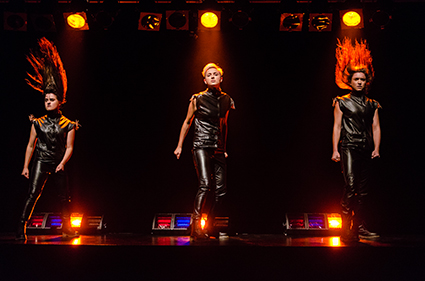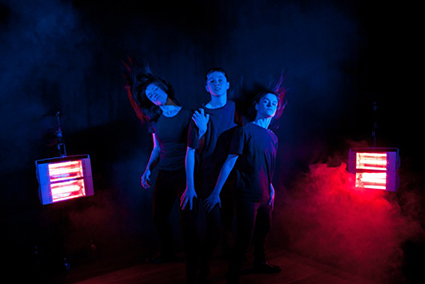Performing hysteria
Lauren Carroll Harris: Hissy Fit, Liveworks

Hissy Fit, Episode, Day for Night, Performance Space (2014)
photo Lucy Parakhina
Hissy Fit, Episode, Day for Night, Performance Space (2014)
“It’s an exciting trend that contemporary art in Sydney is now performance art,” says Nat Randall of self-proclaimed queer, sexy art group Hissy Fit. “Five years ago that shift was not evident in gallery spaces. It’s an amazing platform for us as people making small, weird, queer performance art.”
That approach has seen the Sydney collective, also comprising COFA graduates Emily O’Connor and Jade Muratore, draw heavily on the aesthetics of queer club performance and punk rock heroines to make works that are closer to glittery rock concerts than gallery-bound art. Following appearances at Sydney Contemporary, the Museum of Contemporary Art, Vivid Sydney, Tiny Stadiums, Mardi Gras and You Are Here festivals, their newest work for Performance Space’s Liveworks Experimental Art Festival takes the symbolic motif of headbanging and aligns it with subversive queer, feminist politics. Working with lighting designer Toby Knyvett, dramaturg Emma Price of The Kingpins and choreographer Lizzie Thompson, they call their upcoming work a “gig” combining video and sound—albeit in a performance art context. Leather-clad and shoulder-padded, the trio aims to induce mass hysteria where beery audiences can move beyond the ways gender norms have affected them.
Given the group’s central concern—the ways in which women are allowed, or rather not allowed, to take up space in public—issues of space and movement are in the vanguard of their artistic decision-making. Hissy Fit is less about putting forth a new singular vision of the female body and the feminine and more about creating spaces for women to move outside the straight-line of the norm—to open up small spaces of freedom in a gender-delineated society.
“We were all thinking back to spaces,” says Nat of their time in residence at Carriageworks developing the Liveworks performance, “where we feel we can be freer in our bodies and angry and violent. We’ve spoken a lot about spaces where women can do that and spaces where men can. My personal history is very sports-oriented. On a sports field I could be quite violent. Boys have the capacity to be that from a young age. We tried to identify different legitimate arenas where women also had the capacity to be quite violent and where it was okay.” Their logic is that if those arenas can be carried into the art world, new spaces can be created in which a trigger is pulled and gender norms can change for a moment in time.
For that reason, a previous iteration of their new work I Might Blow Up Someday saw the creation of a death-pit, which Nat describes as “the front of a mosh-pit, a human cyclone with people just rolling in. It could only happen if the audience participated. People got fucking wild. Emily got a black eye because [the artist] Nell hit her in the eye. It was exactly what we wanted. We create this soundscape, we create the lights, we create a seething environment. And then we just want to bust it, and make people reactive, whether in anger or movement or celebration. We just want them to go through a particular journey with us.”
For Hissy Fit, playfulness needn’t contradict politics. Despite the zeitgeist nature of pop-culture discussions about gender and sexuality, the group’s interventions are worlds away from the reductionist slogans of ‘girl power’ that often characterise what might be better called consumer feminism today. “Feminism is in vogue,” says Nat. “We’re very aware of that. It’s been co-opted into marketing frameworks. But we have serious feminist politics that transcend clickbait feminism. We all have a queer understanding of our bodies and we are drawing from 90s heroines in a punk-rock aesthetic when these women were really angry.”
Emily continues: “Our kinds of performance groups are few and far between in the art world. Kingpins and Brown Council were really the only two Australian performance collectives that looked at gender. Kingpins were looking at gender binaries, dressing up as drag kings, and now Hissy Fit is looking at the fluidity of gender and breaking down binaries. Nat and I were having a conversation about why women aren’t angry anymore: why does the next generation have a really chill, relaxed feminist vibe? We are paying tribute to feminisms that have passed, women who we respect, with our own queer politics.”
In their words and in their art actions, Hissy Fit’s references are to heroines from eras when it was tougher to declare oneself a feminist—or just be a woman in public. Chrissy Amphlett, Wendy O. Williams and Peaches and the bands Vixen and Girl School all perform what Jade calls “all sorts of hysterical gestures in punk-rock visual language. It’s about looking to popular culture as a site of interrogation.” Framing the art collective as a band seems a natural way to relate to this site.

Hissy Fit, I Might Blow Up Some Day development
courtesy of the artists
Hissy Fit, I Might Blow Up Some Day development
So does the idea of creating live spaces for participatory audiences to connect directly to queer and feminist politics. A dynamic relationship with the audience, says Jade, is crucial to “the idea of contagion and mass hysteria. Music has a really innate ability to create that: people start moving along to a beat and they get swept away.”
“The audience is as important as our actions in creating the work and creating a gig feel,” says Nat. “We want to be able to drip off the stage and come into the crowd—that’s the sort of off-stage shift we want to occur. We’re sort of trapped, at the moment, onstage. To truly lose control has to come from the audience. That’s what we’re grappling with: creating a work that is about being out of control but being in such a theatrical space. How can we not shock but surprise audiences?”
Beyond the Liveworks performance “our broader enquiry is into deviant, volatile bodies,” says Nat. “The headbanging is just one element of looking at hysteria. That smashing together of popular culture and queer feminist theory—that’s the accessible frame that we want to work in. I can talk to my mum about this work, and I can also talk to a lecturer about it, and have a different engagement. I don’t know if my mum likes our work, but I can talk about it with her, and her experiences.”
“That will always be our inquiry,” says Jade, “the deviant, queer, othered body, how does it operate in the world and what does it do?”
The question is how to engage with the concerns of a wide audience from the edge of the mainstream, staying part of the wider cultural conversation while maintaining political effectiveness. That could be the essential question for Hissy Fit, and for contemporary artists wishing to make change today.
Performance Space, Liveworks Festival of Experimental Art, Hissy Fit, I Might Blow Up Someday, Carriageworks, Sydney, 22-25 Oct
RealTime issue #129 Oct-Nov 2015 pg. 5






